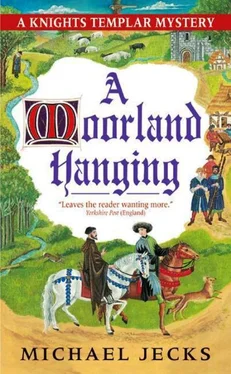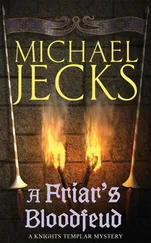“No. At least…” He frowned again.
“It could be important,” Baldwin prompted.
“I don’t know, but someone did overtake me, just about when I got to the road to Chagford. It was dark by then, but there was someone north of me, riding quietly. I didn’t see who.”
“How long after you saw the pair of riders would that have been, do you think?”
“Not very long. I had to cross the Cherry Brook, and the pony was slow, but not more than a few minutes.”
“He was far off?”
“I didn’t look.” The farmer’s voice had fallen to a sullen mutter, and his axe rose and fell only sluggishly as he was pressed.
“Why? Surely it was strange to hear a rider at that time of night, especially off the road?”
Face reddening, the farmer struck again at the log and made no answer.
“Coyt? I said, why didn’t you look?”
Suddenly the farmer whirled and faced him, not aggressively, but with belligerent shame. “Because I thought it could be Old Nick. That’s why!”
“Old…”
Simon quickly interjected. “The Devil, Baldwin. The Devil.” And Adam Coyt turned and walked away from them.
As soon as he was out of earshot, Baldwin threw up his hands in despair. “The Devil! In God’s name! Why do these people still insist on such ridiculous beliefs? If he’d only glanced round, he could have seen who it was. It could have been Robert, John – or neither! But because of a stupid…”
“Not so stupid, Baldwin,” said Simon shortly. “He had no idea that someone had been killed, had no idea that the rider so near could have been involved. These moorland farms are so remote, far from anyone. Have you not felt the loneliness of the moors? It is easy for a man’s mind to turn to things like this out here. And there are many stories about the Devil.”
“Simon, really! That’s no excuse. If this man had just taken a quick look, he might have…”
“I might have what?” Adam Coyt had returned unnoticed. “You don’t know these moors, you haven’t been out here. You don’t live here all year like I do, and you haven’t seen the things the moors can do to a man. You just can’t understand like we do. Take that man Bruther. Yes, the horse riding past me might have been carrying his murderer – but so what?”
“What do you mean?” Baldwin’s face was screwed into a mask of irritated confusion.
“Bruther brought it on himself. He was far out into the moors, and the moors look after themselves, that’s all I’m saying. This area is all different when you live here. You might think I’m foolish to believe in Old Nick or Crockern. It’s easy for you. You’ll leave here and go back to your own village. Me, I’ve got to stay and live here. And I can’t do that if the land won’t let me. Bruther didn’t believe either, he thought it was all superstition. I heard him once, laughing at the thought that Crockern might decide to have revenge on miners living too far out on his moor. He said he didn’t mind Crockern, he said he’d offer a fair price. It doesn’t do to make fun of the spirits on their own land.”
“So you think it was this Crockern who killed Bruther? Not the Devil?” Baldwin’s tone was derisive.
“I don’t know. And I don’t care. Whoever killed him was keeping Crockern happy, that’s all I know.”
“Myths and superstitions!” Baldwin muttered frustratedly as the four left Coyt’s house and began to follow the road into the moors. If the man had only looked, they might now have a fresh witness, or at least the name of someone who could have seen who the two riders were. It was possible that this man could have been Bruther’s murderer, too.
“If men behaved normally and ignored the old wives’ tales,” he said bitterly, “not only would they be less scared all the time, they would probably manage to work better and be happier in their lives. Crockern and Old Nick!”
Simon smiled faintly at the knight’s disgust. “There’s not much else here for people, though, Baldwin. Anyway, the question is, who was on that horse?”
“If we take the word of that farmer, it was the Devil.”
Simon knew how little regard his friend had for the old stories – Baldwin had ridiculed them often enough before. The knight was a well-travelled man, with more experience of the world, and Simon found it hard to argue the case with him. Even so, he found the knight’s irascible outbursts against deeply held local beliefs very insulting.
“Simon?” Baldwin gave him a shame-faced grin. “I am sorry – but I have seen too many people harmed by rumors and stories to want to have any truck with them. You are right, old friend. We need to discover who the single rider was. It could have been one of the Beauscyr sons, of course. Robert can give us little account of where he went that night, and John was away from the inn, although he has not admitted this to us yet.”
The bailiff was mollified by his change in mood. “So now we must try to find out about three men, not two,” he mused. “The pair of riders seen by Samuel and Ronald, and the single one heard by Coyt.”
“Yes. It is odd, though.” Baldwin’s face was pensive. “After talking to Sir Robert, I could have sworn he was one of the two riders – he looked so guilty. Perhaps he was the lone rider who later overtook Coyt?”
“But if he was, did he kill Bruther? Or were Smyth and his man responsible? And if it was Smyth who killed Bruther, what was Sir Robert doing out there?”
“If it truly was him,” Baldwin murmured. “Anyway, the killer must belong to one of the two groups, surely? Miners or men of the Beauscyr demesne.”
“I think so, yes. Unless…” Baldwin glanced at him. Simon chewed his lip and shrugged. “There is another group, I suppose, Baldwin. Farmers, like Coyt himself, have been affected as well. Their moors are being dug, the water in their streams diverted, their pastures ruined.”
“Is that reason enough to kill?”
They had arrived at the clapper bridge again, and Simon let his horse pause to drink. “I don’t know. It depends on what people thought of Bruther, doesn’t it? What sort of person was he? From Sir Ralph’s story he would appear to have been a bold enough fellow, at least when he had other people with him he was. And he was rude to Robert, too, just before we first came here.”
“Yes. Most say he was a rash young man, always making enemies,” Baldwin admitted. “Though Smyth spoke well enough of him.”
“It’s not like olden times when villeins were always subservient. This man seems to have taken willfulness to an extreme. I mean, how many runaways would dare to insult two men like Sir Robert, his master until recently, and Sir Ralph, a man who is well-versed in battle and clearly prepared to defend his name?”
“He did not, though, did he?”
“No, but only because there were a number of miners there and it would have been foolish.”
“The same goes for when Sir Robert was insulted by Bruther. The fellow must have had a death-wish to have been so forthright.”
Simon stared at his friend. “Baldwin, how often have you seen people behave that way?”
“A villein, you mean? Never.”
“What about other men?”
Shrugging, Baldwin drew his mouth into a glum crescent. “For someone to be rude to a knight is mad, and…”
“You miss my point. The only time I’ve seen people intentionally demean a knight or a man-at-arms is when they knew themselves to be the more powerful!”
“Well, yes, but you are surely not suggesting that a mere serf could feel himself more powerful than, say, Sir Robert? One only has to look at them to see how different they are. One is poor and lives in a rude hovel, while the other is wealthy, the heir to a great hall and money, with a rich estate, and born into the King’s highest esteem. How on earth could a miserable peasant like Bruther think he was the equal of such a man – let alone superior.”
Читать дальше












